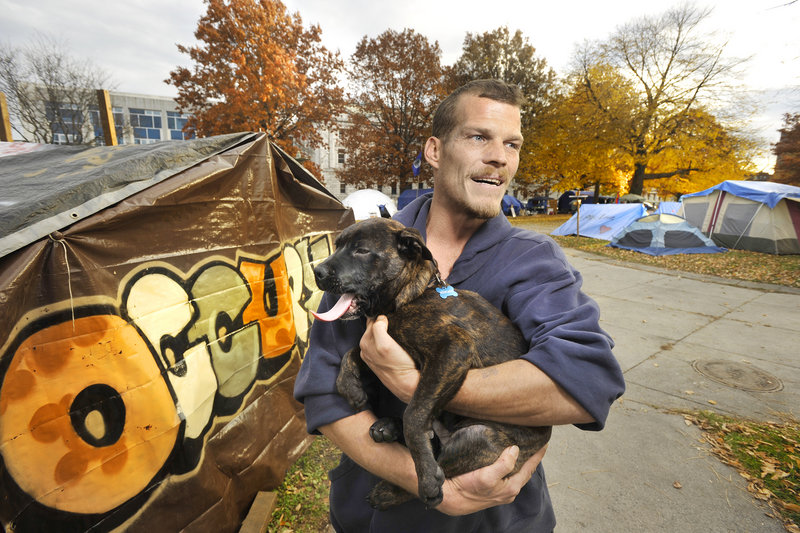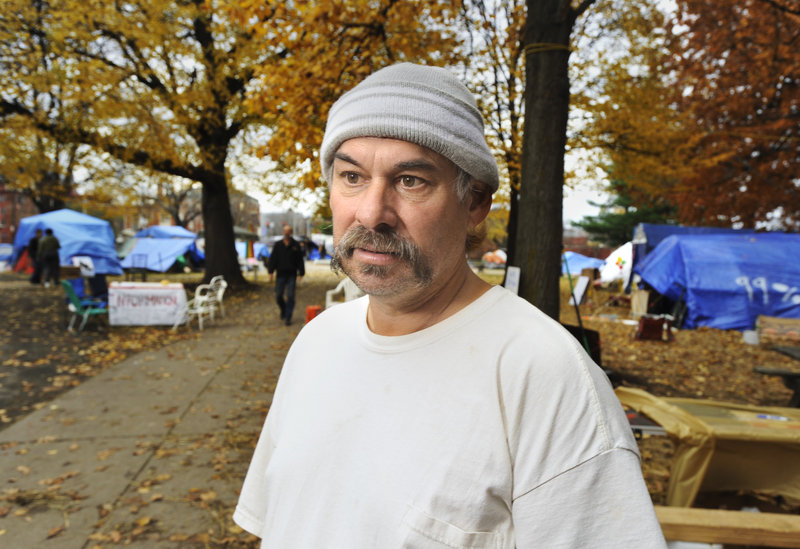PORTLAND — Even as police forcibly cleared Occupy camps in several U.S. cities Tuesday, the Portland encampment met a city deadline for providing a written plan demonstrating that it’s ready for winter and can be safe despite the inevitable cold.
Several people among the roughly 75 activists in Lincoln Park said Tuesday they hope the three-page letter assures city officials there’s no need to remove anyone. The letter spells out how the group will handle fire and health concerns, and promises that there will be no violence, threats or intoxication within the camp.
“From my understanding, there’s not going to be any movement against Occupy Maine in Lincoln Park unless there’s a health or safety issue,” said Chris Schisler, who plans to use strapping to create an A-frame over his tent to help shed snow. “If we take care of each of those, Occupy Maine should be left alone.”
City spokeswoman Nicole Clegg said the city could enforce a local ordinance against camping in city parks, and has received some complaints about the protest, but is taking a more tolerant approach. City staff from the inspections, parks and fire departments will review the group’s letter and conduct an inspection of the park later this week to make sure there are no public safety hazards and no health and safety ordinances being violated, she said.
“We have been clear they need to honor all city ordinances, except the one we’ve permitted, which is overnight stay in city open space,” Clegg said. She would not say the city has overtly granted the protesters permission to stay in the park indefinitely, but said, as she has before, “We are taking a day-to-day approach to see how this evolves.”
The local Occupy Maine encampment is among scores that have sprung up all over the nation and overseas, largely to protest an economic and political system they say enriches a small number of people — the so-called “1 percent” — at the expense of everyone else. The weeks-long protests have been mostly peaceful, but there have been high-profile clashes with police in some cities, while others reported overdoses or violence nearby.
In Portland, a chemical explosive was tossed into the Occupy Maine camp’s kitchen in late October, allegedly from a passing car. No one was seriously injured, but police investigated and the camp made changes to the location of tents in response.
The letter delivered Tuesday to the city indicates the following steps have been taken or will be:
• A nurse practitioner is there or on call for medical issues that don’t require calling 911.
• Members are being trained in winter survival skills by SOLO Wilderness Medical School.
• No open pit or wood fires are allowed.
• Fire extinguishers are distributed throughout the site.
• Tents have been given identification numbers, and emergency evacuation procedures were drafted.
• No smoking is allowed in common areas.
• A network of local residents has agreed to provide shelter and hot showers if needed.
• Dishes are washed at a nearby church.
• Two portable toilets have been rented and are emptied twice weekly.
The promises are common-sense goals for the group, supporters say.
“They have the same concerns the city does about the safety and well-being of folks that are part of the Occupy Maine encampment,” said John Branson, a lawyer representing the group who helped facilitate the communication.
The Occupy group in Portland is an offshoot of the Occupy Wall Street movement, but the measured relationship between the protesters and the city is in stark contrast to violent confrontations that have erupted elsewhere in the country, namely New York City, Portland, Ore., and Oakland, Calif.
Tuesday morning, hundreds of police in riot gear forced protesters out of the Occupy Wall Street encampment and demolished the tent city that was the epicenter of the Occupy movement. But late Tuesday, a mass of protesters had returned to Zuccotti Park.
Portland Mayor-elect Michael Brennan visited the Lincoln Park protest site over the weekend.
“Portland is not Oakland and it is not New York City,” Brennan said. “My hope is it won’t get to that type of situation and we won’t be confronted with the choices they were in other parts of the country.”
Keeping the lines of communication open is essential, he said.
“Actually, I think the city staff has done a very good job with striking a balance between protecting people’s right to protest and make political statements and ensuring the people that are there are in a safe environment and there aren’t any immediate health concerns.”
Mike Jacobs, who joined the Lincoln Park campers recently, said they have been watching and learning from the other protests.
“We definitely need to stay nonviolent and approach peaceful resolution on any issues,” he said.
Deese Hamilton said the violence in other cities was unfortunate and he is sad for his fellow protesters, but he also is aware that there have been more acute problems at those larger encampments. There have been reports of violence, drug dealing and other criminal activity as well as more serious sanitation concerns.
Hamilton said he expects the local protesters to do what they can to avoid a confrontation.
“If the police want us to leave, I have to go. I’m not going to fight it,” he said.
Hamilton thinks the biggest threat to the Occupy Maine encampment is the elements. Portland averages 62 inches of snow a year, and an early snowfall at the end of October dumped more than 5 inches in Portland, collapsing some protesters’ tents.
As of Tuesday, there were 53 protester tents in the park, with seven more communal tents for kitchen, medical, library and other purposes. Protesters are planning to stay through the winter, layering tarps over tents and piling leaves and hay around the base of tents to keep in warmth.
The library is equipped with a propane heater, and another will be set up in the spiritual dome next door, Hamilton said. People can go to those places to get warm, or even spend the night if they get too cold in their own tents, he said.
Despite their preparations, they still hope to get donations of blankets, jackets and gloves, he said.
John Schreiber, who works as a baker during the day, said the occupation will survive the winter, noting that people have been camping outside for hundreds of generations.
“At Valley Forge, they didn’t have Gore-tex. They couldn’t run down the street and buy wool socks,” he said. “I think we can take care of ourselves.”
Staff Writer David Hench can be contacted at 791-6327 or at: dhench@pressherald.com
Send questions/comments to the editors.




Success. Please wait for the page to reload. If the page does not reload within 5 seconds, please refresh the page.
Enter your email and password to access comments.
Hi, to comment on stories you must . This profile is in addition to your subscription and website login.
Already have a commenting profile? .
Invalid username/password.
Please check your email to confirm and complete your registration.
Only subscribers are eligible to post comments. Please subscribe or login first for digital access. Here’s why.
Use the form below to reset your password. When you've submitted your account email, we will send an email with a reset code.